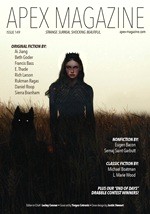“Shadows Below Seaway Trains” by Ai Jiang
“I Remember a One-sided Die” by Francis Bass (Translated by Jiang Caterina)
“Seven Ribbons” by Beth Goder
“Heart Seeds” by E. Thade
“Lies as the Natural State of Things” by Rich Larson
“To Kill a Language” by Rukman Ragas
“Extenta” by Daniel Roop
“Things the Older Boy Understand” by Sierra Branham
“As it Comes” by Derek Alan Jones
“Swan Song” by Liam Hogan
“The Fifth Horseman” by Cressida Roe
Reviewed by Chuck Rothman
The March/April Apex starts out with “Shadows Below Seaway Trains” by Ai Jiang, set in a future where the population is declining and where people are paid to be parents of children created from their own DNA. The story describes the protagonist going through the process, urged on by his friend Atlas, who doesn’t seem the type of person whose advice was worth anything. I really didn’t find the story engaging and it doesn’t seem to be making any point.
Francis Bass comes up with an intriguing situation in “I Remember a One-Sided Die,” told from the point of view of an alien race that can’t remember more than one day before the current one. !uau makes contact with humans who she thinks can help them with a problem with their crops. It’s an interesting concept, but I found myself with too many questions about logistics to immerse myself in the story.
Beth Goder’s “Seven Ribbons” has Atana, a prisoner, remember seven ribbons that tell her story, each showing a particular memory. This is a world with two bordering states that follow different laws and rules and whose borders are unclear. We learn the meaning of the seven ribbons at the end. Interesting type of storytelling, but too low key to bring out the drama inherent in the situation.
“Heart Seeds” by E. Thade is a series of letters written by Lan, which seems to be an AI trying to make sense of the world after an apocalypse. Lan’s human friend Bireh tries to help it understand what’s going on. It’s mostly a litany of horrible images with a slight bit of hope at the end.
Rich Larson contributes “Lies as the Natural State of Things,” the story about a group of fishermen who discover a wooden cup inside a lobster pot. Claude learns the secret of the cup, which is magic: the person who poured into the cup could make the drinker forget one memory. And, of course, Claude abuses the power of the cup. A more traditional story than most in this issue and I liked the way it played out.
“To Kill a Language” by Rukman Ragas is the first of three flash fiction stories. It is essentially a manual on how to repress people, describing a process, and showing a bit of remorse about it. I can see it’s making a contemporary political point, but without characterization and thus a bit sterile.
Daniel Roop’s “Extenta” postulates a future where some humans are designated Homo extenta and are used for manual labor because it’s cheaper than robots. Jix is one of these, and turns to using cards as stories to survive. Interesting setup with a decent ending.
“Things the Older Boy Understand” by Sierra Branham concerns two boys, the last survivors of a parasite attack that destroyed the crew of the ship. The younger boy has the parasite; the older one—aged ten—does not and had to decide whether to kill the other to avoid spreading the disease. Powerful situation well portrayed.
The next group of stories are winners of a drabble fiction contest—stories under 100 words.
“As it Comes” by Derek Alan Jones portrays a pair of people who get a wish for their love in a way that doesn’t bode well.
Liam Hogan contributes “Swan Song,” where drones are the only things left after another apocalypse.
“The Fifth Horseman” by Cressida Roe is ultimately a retelling of Greek myth, but it’s different enough to stand out.
Chuck Rothman’s novel The Cadaver Princess will be published by Experimenter Publishing, the book imprint of Amazing Stories. He’s online at chuckrothman.com.
 Apex
Apex